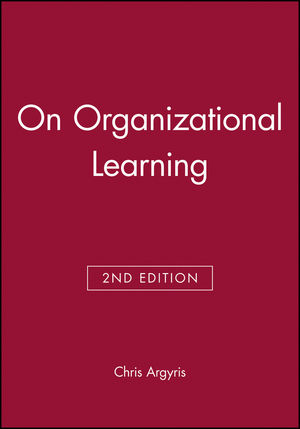On Organizational Learning, 2nd EditionISBN: 978-0-631-21309-3
Paperback
482 pages
June 1999, Wiley-Blackwell
 This is a Print-on-Demand title. It will be printed specifically to fill your order. Please allow an additional 10-15 days delivery time. The book is not returnable.
|
||||||
List of tables.
Acknowledgments.
Preface.
Introduction: The Evolving Field of Organizational Learning.
Part I: Organizational Defences:.
1. Making Sense of Limited Learning.
2. Tacit Knowledge and Management.
3. Why Individuals and Organizations Have Difficulty in Double-Loop Learning.
4. Creating a Theory of Practice: The Case of Organizational Paradoxes.
5. Today's Problems with Tomorrow's Organizations.
6. Teaching Smart People How to Learn.
7. A Leadership Dilemma: Skilled Incompetence.
Part II: Inhibiting Organizational Learning and Effectiveness:.
8. Organizational Learning and Management Information Systems.
9. Strategy Implementation: An Experiment in Learning.
10. How Strategy Professionals Deal with Threat: Individual and Organizational.
11. The Dilemma of Implementing Controls: The Case of Managerial Accounting.
12. Human Problems with Budgets.
13. Bridging Economics and Psychology: The Case of the Economics Theory of the Firm.
Part III: The Counterproductive Consequences of Organizational Development and Human Resource Activities:.
14. Good Communication That Blocks Learning.
15. Reasoning, Action Strategies, and Defensive Routines: The Case of OD Practitioners.
16. Inappropriate Defences Against The Monitoring of Organizational Development Practice.
17. Do Personal Growth Laboratories Represent an Alternative Culture?.
Part IV: The Inhibition of Valid and Usable Information from the Correct Use of Normal Science:.
18. Actionable Knowledge: Design Causality in the Service of Consequential Theory.
19. Field Theory as a Basis for Scholarly Consulting.
20. Unrecognized Defences of Scholars; Impact on Theory and Research.
21. Seeking Truth and Actionable Knowledge: How the Scientific Method Inhibits Both.
22. Problems and New Directions for Industrial Psychology.
23. The Incompleteness of Social-Psychological Theory: Examples from Small Group, Cognitive Consistency, and Attribution Research.
24. Dangers in Applying Results from Experimental Social Psychology.
25. Making Knowledge More Relevant to Practice: Maps for Action.
26. Participatory Action Research and Action Science Compared.
27. Some Unintended Consequences of Rigorous Research.
Index.



